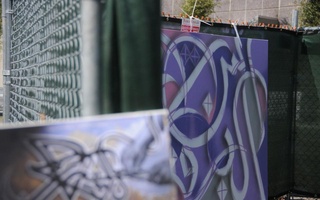A professor central to Harvard’s Near Eastern Languages and Civilizations Department and known for his wit, humility, and extensive knowledge of Arabic culture died Jan. 23. Wolfhart P. Heinrichs was 72 years old. He is survived by his wife Alma Giese-Heinrichs, three siblings—Dietmar, Hilberg and Ortrud, who live in Germany—extended family, and many friends.
Yale professor Beatrice Gruendler, who was mentored by Heinrichs, said that his life and death could best be summarized by an old Arabic quotation from the writer Badi’ al-Zaman al-Hamadhani:
“He was the water and clay of knowledge, he was city and storehouse of erudition, and he died with treasures in his mind not yet unveiled.”
A former student, American University professor Erez Naaman, called Heinrichs a “giant figure” in the field of Arabic studies.
Born Oct. 3, 1941 in Cologne, Germany, Heinrichs was the son of a university professor of ancient Germanic studies and an Old Norse lecturer. As a young adult, Heinrichs studied English, French, Latin, Greek, and Hebrew, learning and teaching in various European universities, particularly in Germany, until 1977, when he was offered a one-year position as visiting lecturer at Harvard.
Soon after, Heinrichs took on a full professorship of Arabic at Harvard, which he held from 1978 until 1995. In 1980, he married Alma Giese, a fellow accomplished scholar who received her doctorate from the University of Giessen the same year. “Both he and his beloved Alma shared in his love of language and literature, which surely was one of the greatest joys of his life,” said colleague William A. Graham, a professor and former dean at Harvard Divinity School.
Since 1989, Heinrichs wrote 50 academic articles on various topics such as literary criticism, and was co-editor of the Encyclopedia of Islam. In 1996, he became the James Richard Jewett Professor of Arabic.
Heinrichs was known for his encyclopedic knowledge of the Classical Arabic language, culture, and literature, friends and colleagues said, as well as a variety of Neo-Aramaic languages—some near-extinct—including Ṭūrōyo and Senāya.
In an email, Islamic Studies graduate student Gregory Halaby, a former student of Heinrichs’s, wrote that he was “above all genuine and honest,” possessing such traits as “brilliance, humor, humility, and eccentricity.”
Graham also emphasized Heinrichs’s exceptionally strong character.
“Wolfhart was the gentlest, kindest, and most generous friend and colleague whom one could wish for,” Graham wrote in an email. “His wide knowledge of seemingly everything was on prime display in his engagement with poetry.”
Many former students remembered Heinrichs’s passion for poetry. Heinrichs composed limericks for each of his graduate students upon completion of their dissertation. Former students said that his limericks were witty, perfectly capturing Heinrichs’s refined sense of humor. Gruendler recounted an incident when Heinrichs, who was correcting a paper, commented on a coffee stain, writing, “Cat spilled coffee and was severely reprimanded.”
NELC graduate student Avigail Noy said she remembered one of her first correspondences with the professor, which included his trademark sense of humor.
“He said, ‘Every year between zero and four people get in. But if you don’t try you won’t get in for sure,’” Noy said. “So even though he was ‘the’ Professor Heinrichs, it didn’t keep him from encouraging—from the heart—prospective students.”
Read more in Faculty News
Open House Showcases New Hispanic Research CenterRecommended Articles
-
Government Department Lacks Scholar Specializing In Middle Eastern StudiesHarvard’s Government Department remains without an expert in the field of Middle Eastern political science.
-
 Yugoslavian Oral History Project Removed from Science Center
Yugoslavian Oral History Project Removed from Science Center -
Reflections on an Earlier CairoI remember landing early evening in Cairo on June 13, 1973 as though it were yesterday, the sun still shining, the air hot and dusty.
-
 eL Seed Demonstrates Arabic Graffiti
eL Seed Demonstrates Arabic Graffiti -
Living World MusicIn short, I’m hung up on world music because it allows me to be more human.
-
Embrace the AbsurdIt’s all pretty much inherently absurd when you realize you’re worrying about letters on a piece of paper that already makes you elite.













